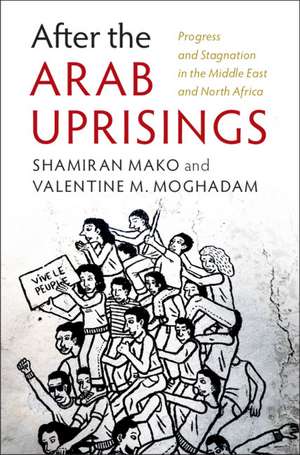After the Arab Uprisings: Progress and Stagnation in the Middle East and North Africa
Autor Shamiran Mako, Valentine M. Moghadamen Limba Engleză Paperback – 21 iul 2021
| Toate formatele și edițiile | Preț | Express |
|---|---|---|
| Paperback (1) | 237.92 lei 3-5 săpt. | +15.88 lei 4-10 zile |
| Cambridge University Press – 21 iul 2021 | 237.92 lei 3-5 săpt. | +15.88 lei 4-10 zile |
| Hardback (1) | 528.94 lei 6-8 săpt. | |
| Cambridge University Press – 21 iul 2021 | 528.94 lei 6-8 săpt. |
Preț: 237.92 lei
Nou
Puncte Express: 357
Preț estimativ în valută:
45.53€ • 47.41$ • 38.48£
45.53€ • 47.41$ • 38.48£
Carte disponibilă
Livrare economică 17 februarie-03 martie
Livrare express 31 ianuarie-06 februarie pentru 25.87 lei
Preluare comenzi: 021 569.72.76
Specificații
ISBN-13: 9781108454797
ISBN-10: 1108454798
Pagini: 264
Dimensiuni: 153 x 230 x 16 mm
Greutate: 0.41 kg
Ediția:Nouă
Editura: Cambridge University Press
Colecția Cambridge University Press
Locul publicării:Cambridge, United Kingdom
ISBN-10: 1108454798
Pagini: 264
Dimensiuni: 153 x 230 x 16 mm
Greutate: 0.41 kg
Ediția:Nouă
Editura: Cambridge University Press
Colecția Cambridge University Press
Locul publicării:Cambridge, United Kingdom
Cuprins
1. Introduction and Overview; 2. Pathways to Democratization: The Arab Spring in Comparative Perspective; 3. States and Political Institutions; 4. Civil Society; 5. Gender and Women's Mobilizations; 6. International Connections and Interventions; 7. Findings and Conclusions.
Recenzii
'In their sweeping comparative analysis of the divergent outcomes of the Arab Spring, Mako and Moghadam not only highlight the importance of women's activism; they prove it was a fundamental determinant of those outcomes. This is a novel and powerful analysis that will be essential for understanding MENA since 2010.' Jack A. Goldstone, George Mason University
'A brilliant multi-level and cross-national study of why the Arab Spring resulted in dramatically different outcomes for the Arab countries involved. Fine-grained top down and granular bottom up analyses of the causes of violent versus nonviolent responses to legitimate protests. Critical insights into lessons for democratic possibilities /or authoritarian regime pathways in a vital and contested region of the world. Must read for students of history and the Middle East.' Suad Joseph, University of California, Davis
'Mako and Moghadam present an expansive and thought-provoking analysis of the Arab uprisings and their aftermath that, unlike many studies, pays careful attention to factors that others skim over or else entirely ignore. In addition to the role of diverse civil society organization and the role of women, they center the role of external actors in shaping the direction and outcome of the individual uprisings. This theoretically and empirically rich analysis will be a must read not only for scholars of the Middle East, but for the fields of social movements, democratization, and contentious politics as well.' Jillian Schwedler, City University of New York
'a bracing assessment of revolution, repression, and war … The book stands to inform a broad range of academics and nonspecialists seeking to understand how the Arab world has changed - sometimes for better, often for worse - and where the region is headed.' Jason M. Brownlee, The Middle East Journal
'A brilliant multi-level and cross-national study of why the Arab Spring resulted in dramatically different outcomes for the Arab countries involved. Fine-grained top down and granular bottom up analyses of the causes of violent versus nonviolent responses to legitimate protests. Critical insights into lessons for democratic possibilities /or authoritarian regime pathways in a vital and contested region of the world. Must read for students of history and the Middle East.' Suad Joseph, University of California, Davis
'Mako and Moghadam present an expansive and thought-provoking analysis of the Arab uprisings and their aftermath that, unlike many studies, pays careful attention to factors that others skim over or else entirely ignore. In addition to the role of diverse civil society organization and the role of women, they center the role of external actors in shaping the direction and outcome of the individual uprisings. This theoretically and empirically rich analysis will be a must read not only for scholars of the Middle East, but for the fields of social movements, democratization, and contentious politics as well.' Jillian Schwedler, City University of New York
'a bracing assessment of revolution, repression, and war … The book stands to inform a broad range of academics and nonspecialists seeking to understand how the Arab world has changed - sometimes for better, often for worse - and where the region is headed.' Jason M. Brownlee, The Middle East Journal
Notă biografică
Descriere
Provides a holistic and cross-disciplinary approach to understanding why a regional democratic transition did not occur after the Arab Spring protests.
